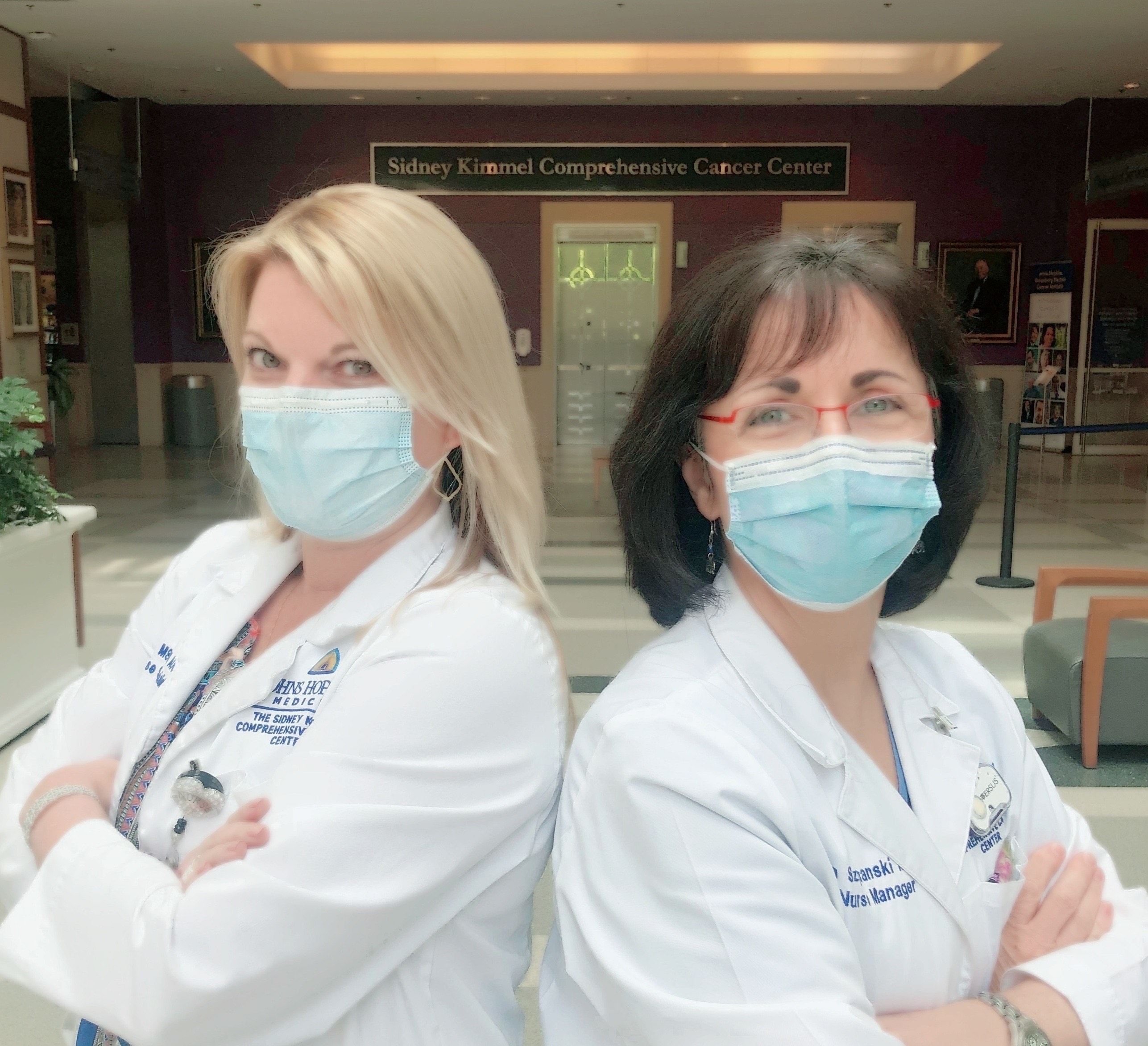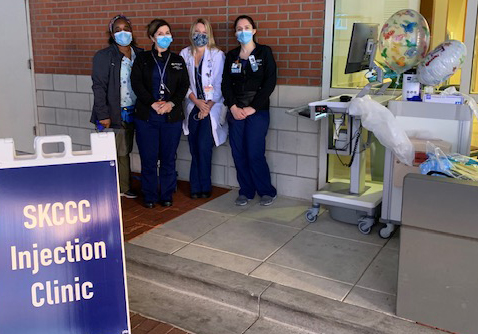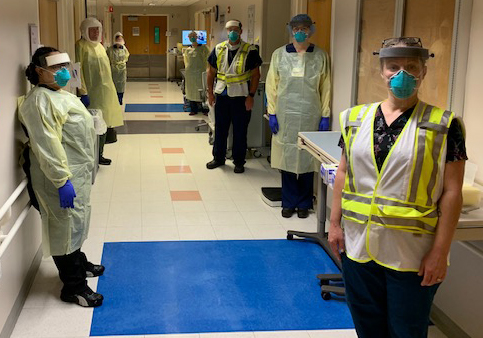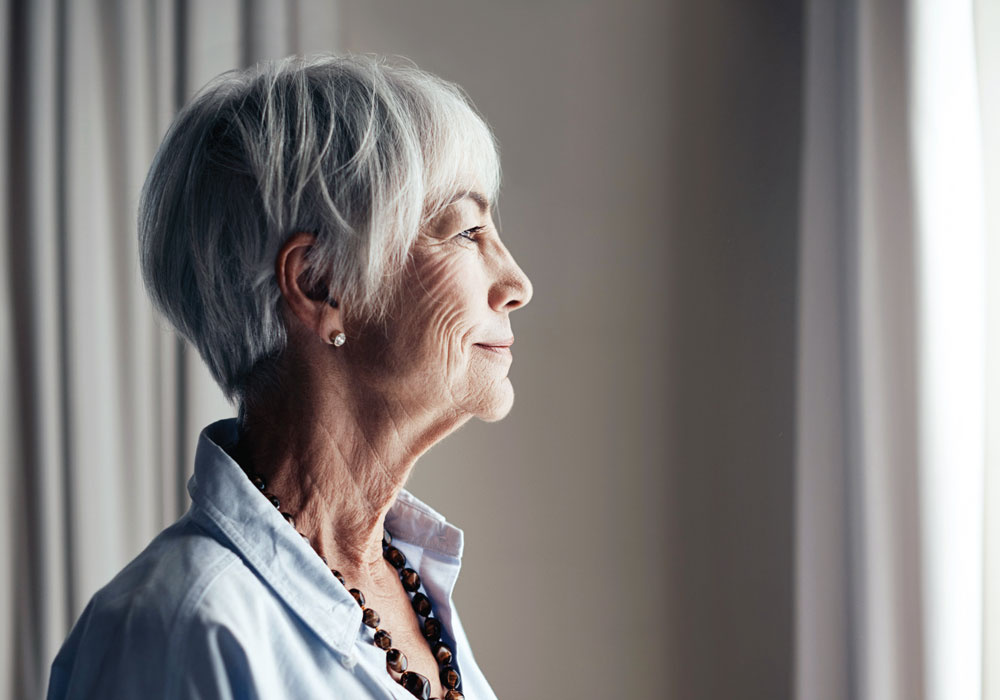No longer just a convenience, drive-throughs are an essential part of social distancing during the COVID-19 coronavirus pandemic. Retailers and healthcare providers alike have taken it beyond the typical food, prescriptions, and banking, offering everything from merchandise to virus testing—and now, thanks to the innovation of two oncology nurses, cancer care.

Curbside Cancer Treatment Clinic
Because they’re at increased risk for serious complications if infected with COVID-19, patients with cancer are extremely careful about avoiding exposure.
“Patients were delaying their cancer treatments. We had an indoor injection clinic on the sixth floor, but they didn’t even want to come into the building,” ONS member MiKaela Olsen, DNP, APRN-CNS, AOCNS®, FAAN, said. Olsen is an oncology and hematology clinical nurse specialist in the Sidney Kimmel Comprehensive Cancer Center at Johns Hopkins Hospital and Greenspring Oncology in Baltimore, MD, a member of the Greater Baltimore ONS Chapter, and a former nurse captain in the U.S. Army.

Together with Gina Szymanski, MS, RN, interim director of nursing, Olsen created a drive-up cancer clinic where patients could continue their cancer care from the security of their own cars. Nurses staffing the clinic offer everything from symptom assessment to growth factor injections, bone strengthening treatments, hormone injections, phlebotomy, post-transplant immunizations, port flushes, dressing changes, and even chemotherapy injections.
“It’s a fully functioning clinic,” Olsen said. “Patients get armbands, all the medications are barcoded, we have safety checks, and all of the nurses are wearing proper personal protective equipment (PPE).” Olsen serves as the operations chief for the cancer center’s COVID-19 Command Center and Szymanski as the incident commander.
The clinic’s first location currently sees about 15–20 patients per day, and Olsen estimated that they’ve treated about 120 patients in the three weeks it’s been open. They opened a second drive-up location on May 11, which is already seeing 12–15 patients per day.
“We’re in an inner city, and people sometime show up for treatments in Ubers and taxis,” Olsen said. “Patients love it and don’t want to go back to being seen in the cancer center. We plan to keep both going after COVID-19 is over.”
COVID-19 Cancer Urgent Care Clinic
Another need that Szymanski and Olsen identified was for a specific biocontainment unit where patients with cancer who had COVID-19 symptoms could access testing and treatment, instead of the emergency room.
“When we heard about what was happening in Italy and New York, we knew we had to keep patients with cancer safe,” Szymanski said. “Despite being COVID-positive, patients still need cancer treatment or symptom/toxicity management. Some patients with cancer have a harder time clearing the virus and are retaining it for months, so without this setting, they would have to go to the emergency department for transfusions.”

In less than two weeks, Szymanski directed the transformation of a vacated radiology space into a true biocontainment unit, complete with negative pressure and HEPA filtration. Nurses staffing the unit are heavily trained in integrated critical care, biocontamination, and containment.
COVID-19 symptoms are similar to many symptoms and side effects of cancer and its treatment. Patients who call the telephone triage line with symptoms suspicious for COVID-19 are told to drive to a designated spot at the cancer center, where they're escorted by an oncology RN and a transport safety nurse to the new unit for testing and treatment. Szymanski says that the majority of their patients with cancer have not tested positive for the virus, but if they are, they can be treated in the new unit, which is ambulatory. If they require inpatient care, they're transferred to a biocontainment, inpatient, COVID-19–positive unit.
Some of the clinic’s key advantages are that it reduces admissions, emergency department visits, and readmissions. Nurses can see patients for two to three days in a row if they need care on a regular basis; although patients will spend up to eight hours at the urgent care clinic, they are able to sleep at home at night.
“We ran a 97% occupancy before COVID, so this saves beds and gets people out of the hospital,” Szymanski said. “We treat COVID-positive patients as ambulatory patients as much as we can.”
The Value of Oncology Nursing
What Olsen and Szymanski both observed since March is how prepared oncology nurses have been for the pandemic.
“We were already teaching patients about good handwashing and avoiding crowds before COVID. We believe our patients with cancer were more aware and acted faster and smarter than the average person,” Olsen said.
“Because this virus is so contagious, healthcare providers must wear PPE perfectly. If not, transmissions are likely,” Szymanski explained. “A lot of it has been about convincing people, but the one group that didn’t need convincing is oncology nurses, who have donned and doffed PPE their entire careers.
“The PPE part was easy; it’s just what we did. We were able to spend our time on other creative innovations, like these curbside clinics.”






